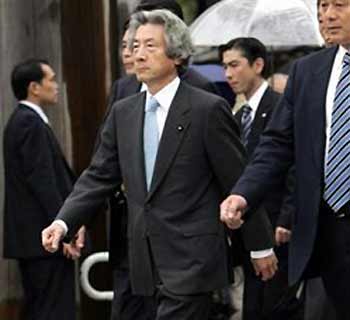|
Koizumi told Bush shrine visits to go on
(Reuters)
Updated: 2006-01-22 13:38
Japanese Prime Minister Junichiro Koizumi told US President George W. Bush
when they met last fall that he will go on visiting a Tokyo war shrine even if
Washington asks him not to, Kyodo news agency said on Sunday.

Japanese Prime
Minister Junichiro Koizumi arrives at the Yasukuni Shrine in Tokyo Monday,
Oct. 17, 2005. [AP] |
Japan's ties with China
and South Korea have chilled markedly since Koizumi took office in 2001 and
began annual visits to Yasukuni Shrine, seen as a symbol of Japan's past
militarism by critics because convicted war criminals are honoured along with
Japan's 2.5 million war dead.
Comments made by a top U.S. diplomat shortly after Koizumi and Bush met
suggested that Washington was growing a bit frustrated with Japan's strained
relationship with its Asian neighbours.
According to U.S. and Japanese sources quoted by Kyodo, Bush asked Koizumi
what his mid- and long-term view of China was when they met in Kyoto last
November.
Koizumi, whose last visit to the shrine was in October, brought up Yasukuni
himself, saying "Even if I am told by the United States not to, I will go,"
Kyodo said.
Koizumi also told Bush that visiting Yasukuni is a "matter of the heart" and
added that he did not understand why his visits prompted criticism from China.
Japanese Foreign Ministry officials were not available to comment on the
report.
The Yasukuni issue has become a barrier to summits with the leaders of China
and South Korea.
In a keynote address on Friday at the opening of a new session of parliament,
Koizumi vowed to mend fences with China and South Korea but made no mention of
his visits to Yasukuni.
Koizumi has repeatedly said that he visits Yasukuni to pray for peace.
Assistant U.S. Secretary of State Christopher Hill voiced frustration with
Japan's chilled ties with its Asian neighbours on the sidelines of Asia-Pacific
Economic (APEC) forum in November, just after Koizumi met Bush, saying that he
wanted to see the situation between Japan and its neighbours "calm
down".
|